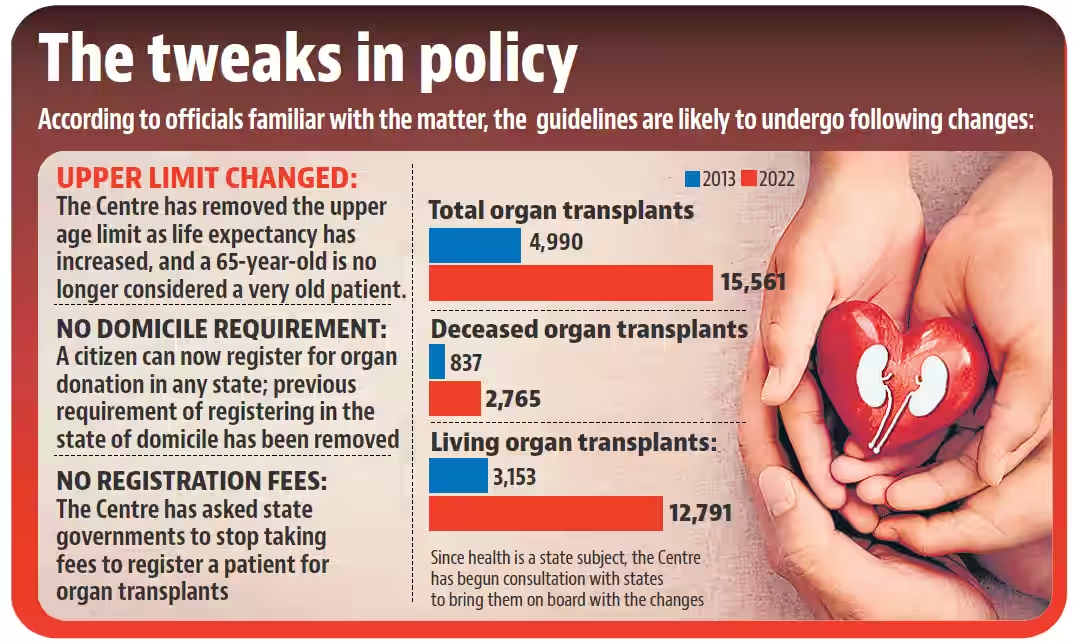Ahmedabad
(Head Office)Address : 506, 3rd EYE THREE (III), Opp. Induben Khakhrawala, Girish Cold Drink Cross Road, CG Road, Navrangpura, Ahmedabad, 380009.
Mobile : 8469231587 / 9586028957
Telephone : 079-40098991
E-mail: dics.upsc@gmail.com

National Organ Transplantation Guidelines
News: Recently, the Ministry of Health and Family Welfare has modified National Organ Transplantation Guidelines, allowing those above 65 years of age to receive an organ for transplantation from deceased donors.
Background:
In India, Transplantation of Human Organs Act, 1994 provides various regulations for the removal of human organs and its storage. It also regulates the transplantation of human organs for therapeutic purposes and for the prevention of commercial dealings in human organs.
Key Details of Revised Guidelines:
The upper age limit has been removed as people are now living longer. Earlier, according to the NOTTO (National Organ and Tissue Transplant Organization) guidelines, an endstage organ failure patient above 65 years of age was prohibited from registering to receive the organ.
There will no longer be any registration fees as was seen earlier in cases of few states such as Gujarat, Maharashtra.
The ministry has removed the domicile requirement to register as an organ recipient in a particular state under a ‘One Nation, One Policy’ move.
Need for new guidelines:
Lack of uniformity pertaining to Organ transplantation as ‘health’ is state subject
A new national policy is sought for Organ transplantation
The steps are aimed at better and more equitable access to organs and also to promote cadaver donations,
which currently form a minuscule fraction of all organ transplants carried out in India.
| Cadaveric Donors - Also called non-living or deceased donors (preferred term), are those who donate their organs or tissue after they have died. |
Few statistics regarding Organ Transplantation in India:
India conducts the third highest number of transplants in the world.
Organs from deceased donors accounted for nearly 17.8% of all transplants in 2022.
The total number of organ transplants – with organs from both deceased and living donors – increased from 4,990 in 2013 to 15,561 in 2022.
Every year, an estimated 1.5-2 lakh people need a kidney transplant.
Way Forward:
Promoting Organ donations is an important initiative that can save lives and benefit society as a whole. By increasing awareness, educating the public, and improving the donation process, we can make organ and tissue donation more accessible and increase the number of potential donors.

Address : 506, 3rd EYE THREE (III), Opp. Induben Khakhrawala, Girish Cold Drink Cross Road, CG Road, Navrangpura, Ahmedabad, 380009.
Mobile : 8469231587 / 9586028957
Telephone : 079-40098991
E-mail: dics.upsc@gmail.com
Address: A-306, The Landmark, Urjanagar-1, Opp. Spicy Street, Kudasan – Por Road, Kudasan, Gandhinagar – 382421
Mobile : 9723832444 / 9723932444
E-mail: dics.gnagar@gmail.com
Address: 2nd Floor, 9 Shivali Society, L&T Circle, opp. Ratri Bazar, Karelibaugh, Vadodara, 390018
Mobile : 9725692037 / 9725692054
E-mail: dics.vadodara@gmail.com
Address: 403, Raj Victoria, Opp. Pal Walkway, Near Galaxy Circle, Pal, Surat-394510
Mobile : 8401031583 / 8401031587
E-mail: dics.surat@gmail.com
Address: 303,305 K 158 Complex Above Magson, Sindhubhavan Road Ahmedabad-380059
Mobile : 9974751177 / 8469231587
E-mail: dicssbr@gmail.com
Address: 57/17, 2nd Floor, Old Rajinder Nagar Market, Bada Bazaar Marg, Delhi-60
Mobile : 9104830862 / 9104830865
E-mail: dics.newdelhi@gmail.com